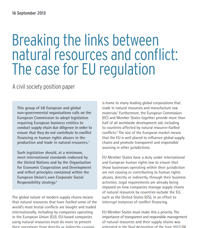
The global nature of modern supply chains means that natural resources that have fuelled some of the world’s most brutal conflicts are bought and traded internationally, including by companies operating in the European Union (EU). EU-based companies using natural resources must do more to prevent their operations from directly or indirectly causing harm. A legislative framework is needed to clarify the responsibilities of European companies and to provide the basis for appropriate oversight by regulators, markets and consumers.
The EU was awarded the Nobel Peace Prize in 2012 for its advancement of peace and human rights. The EU is also the world's largest trading bloc and is home to many leading global corporations that trade in natural resources and manufacture raw materials. Furthermore, the European Commission (EC) and Member States together provide more than half of all worldwide development aid, including to countries affected by natural resource-fueled conflicts. The size of the European market means that the EU is well placed to influence global supply chains and promote transparent and responsible sourcing in other jurisdictions.
EU Member States have a duty under international and European human rights law to ensure that those businesses operating within their jurisdiction are not causing or contributing to human rights abuses, directly or indirectly, through their business activities. Legal requirements are already being imposed on how companies manage supply chains of natural resources by countries outside the EU, such as the United States (US), in an effort to interrupt instances of conflict financing.
EU Member States must make this a priority. The importance of transparent and responsible management of natural resources and their supply chains was reiterated in the final declaration of the June 2013 G8 Summit. The European Commission recently launched a public consultation on a ‘possible EU initiative on responsible sourcing of minerals originating from conflict-affected and high-risk areas’. Recent revisions to the EU Transparency and Accounting Directives and the Commission’s public commitments to greater support for the Organisation for Economic Cooperation and Development’s (OECD) Guidelines for Multinational Enterprises and Due Diligence Guidance are important steps towards this goal. But these measures do not go far enough. We recommend that the European Commission introduce legislation that:
- Creates a legally binding obligation on business to conduct supply chain due diligence to identify and mitigate the risk of conflict financing and human rights abuse;
- Is based on the relevant international instruments, including the International Bill of Human Rights, International Labor Organization (ILO) core treaties and other international human rights law and standards, International Humanitarian and Criminal Law, and the OECD Due Diligence Guidance for Conflict-Affected and High-Risk Areas (OECD Guidance);
- Recognizes the State duty to protect human rights as defined by International Human Rights Law, the company responsibility to respect human rights as contained within the United Nations (UN) Guiding Principles and the need to facilitate victims’ access to justice;
- Applies to all segments of the supply chain;
- Has a global geographical scope, meaning that due diligence should be conducted on supply chains originating in any conflict-affected and high-risk area;
- Has a broad material scope applicable to all natural resources;
- Is founded on a risk-based approach that includes and emphasizes a risk mitigation framework and considers impacts on individuals and communities;
- Complements existing EU initiatives and legislation to promote transparency and promote sustainable development;
- Forms part of a wider comprehensive approach that includes measures to prevent environmental destruction and associated livelihoods and to reinforce governance and encourage security sector and mining reform in natural resource rich developing countries.

